Several thousand people turned out in cities across Australia on October 15 to join the international movement in support of the Occupy Wall Street demonstrations in the United States.
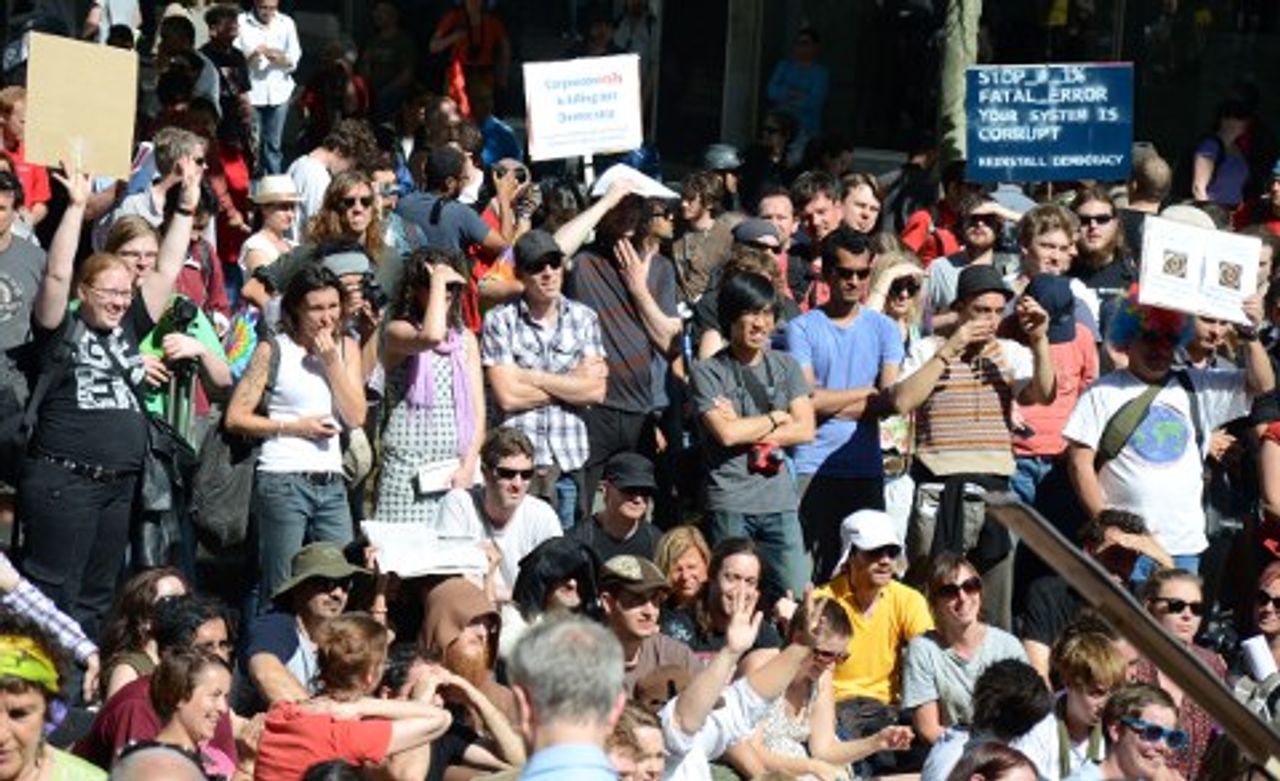 The Occupy Sydney protest
The Occupy Sydney protestThe majority of the protesters were young people. As in the US, the main issue motivating the protests was social inequality. Banners repeated the central slogan of the Occupy Wall Street movement, “We are the 99 percent.” Others demanded an end to the wars in Afghanistan and Iraq, the Labor government’s carbon tax and its brutal anti-refugee policies. People expressed their hostility to the international bailout of the banks and the widening divide between the global financial and corporate elite and the vast majority of the world’s population.
More than 1,000 people rallied at Sydney’s Martin Place, in front of the Reserve Bank of Australia, and another 1,000 attended the event in Melbourne’s City Square. An estimated 200 people protested at Forrest Chase in Perth. Demonstrations were also held in Brisbane, Adelaide, Darwin and Hobart.
In Sydney, police intervened on Saturday night dismantling and removing the tents erected by the 100 or so people who had decided to occupy part of Martin Place. One person was arrested for allegedly “obstructing traffic” during the incident.
 A section of Occupy Melbourne
A section of Occupy MelbourneThe organisation of the protests was dominated by members of the Australian pseudo-left tendencies, such as Socialist Alliance, Solidarity and Socialist Alternative―although they invariably did not identify their political affiliation when speaking.
Representatives of several trade unions spoke in Sydney. Glaringly absent from the statements of the pseudo-left was any reference to, or condemnation of, the complicity of the unions in the destruction of thousands of jobs and slashing of wages by the Australian corporate “one percent” in the steel, car and car parts, airline, construction and other industries, and the budget cuts being imposed by the Labor government.
No official representative of the Australian Greens spoke at the demonstrations. The Greens, a pro-capitalist establishment organisation that is in a de-facto parliamentary coalition with the Labor Party, are instinctively hostile to the international Occupy movement.
Socialist Equality Party members and supporters distributed hundreds of statements published on the World Socialist Web Site and spoke to those who attended in Sydney, Melbourne and Perth. SEP members also addressed the protests in these cities. Highlighting the significance of the international movement that has developed, they emphasised the critical issues of political perspective confronting young people who wanted to fight capitalism, above all the need to develop an international and socialist party of the working class.
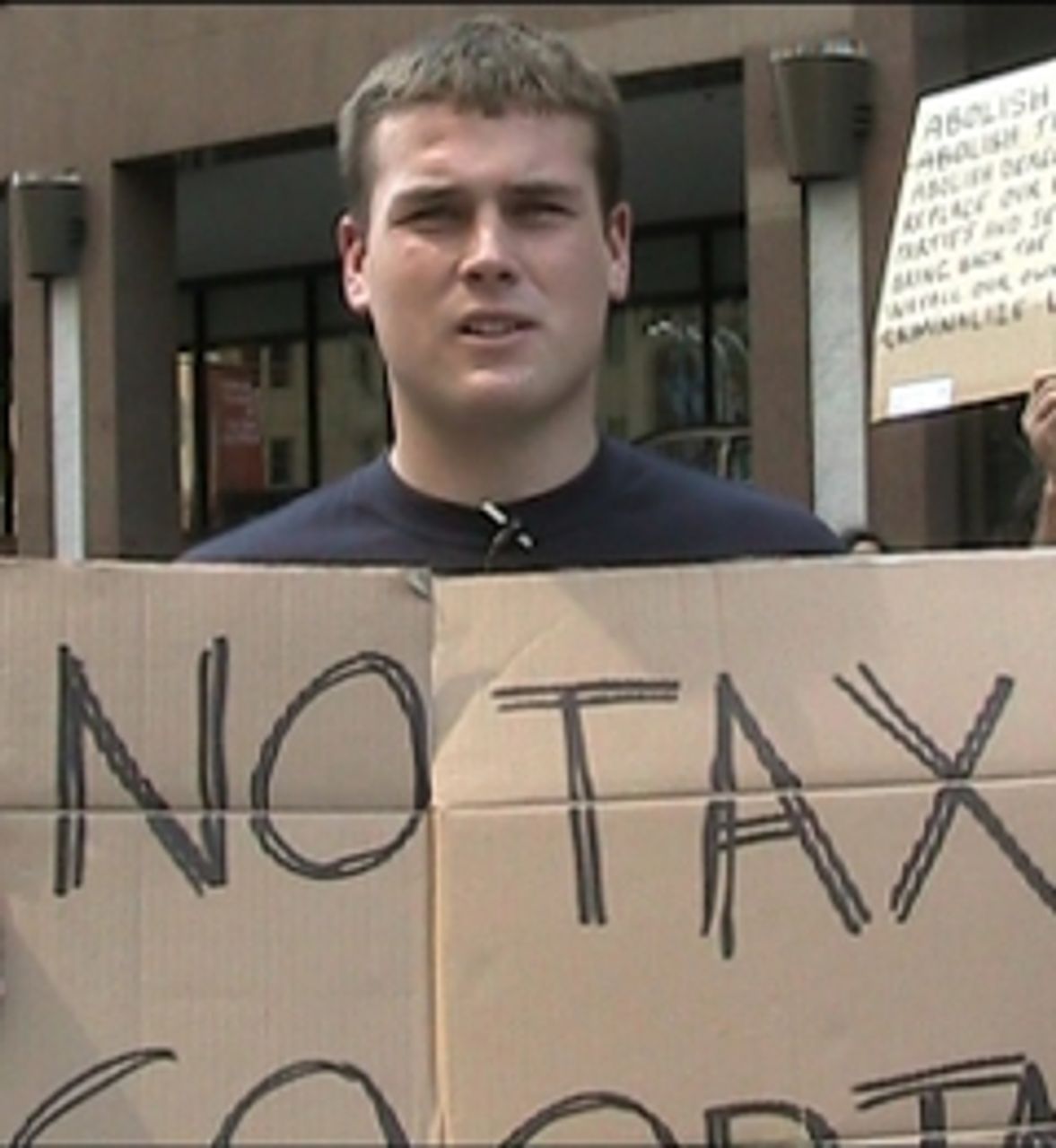 Lewis
LewisThe WSWS interviewed Lewis O’Brien, a young worker at Sydney ports who carried a sign saying: “No tax, good tax.” Lewis explained that he was referring to the Gillard Labor government’s carbon tax, which will increase the cost of basic goods and many workers believe it will be used as a pretext by companies to sack them. “I work at the ports as a casual worker, like 90 percent of the workforce there,” he said. “At the ports we use a lot of petrol, and I don’t know how the carbon tax is going to affect my job.”
When asked why he had come to the rally, Lewis said: “I don’t think the average worker, especially a young worker, has much of a say or any chance in today’s world. We’re just not represented in parliament. Someone needs to stand up and represent the worker, because we’re just getting phased out. I would like to get rid of the carbon tax without having to vote in [Federal Opposition leader Tony] Abbott.” When asked for his opinion on a political party that fought for the interests of the working class on a socialist perspective, Lewis said: “That’s good. I would vote for that.”
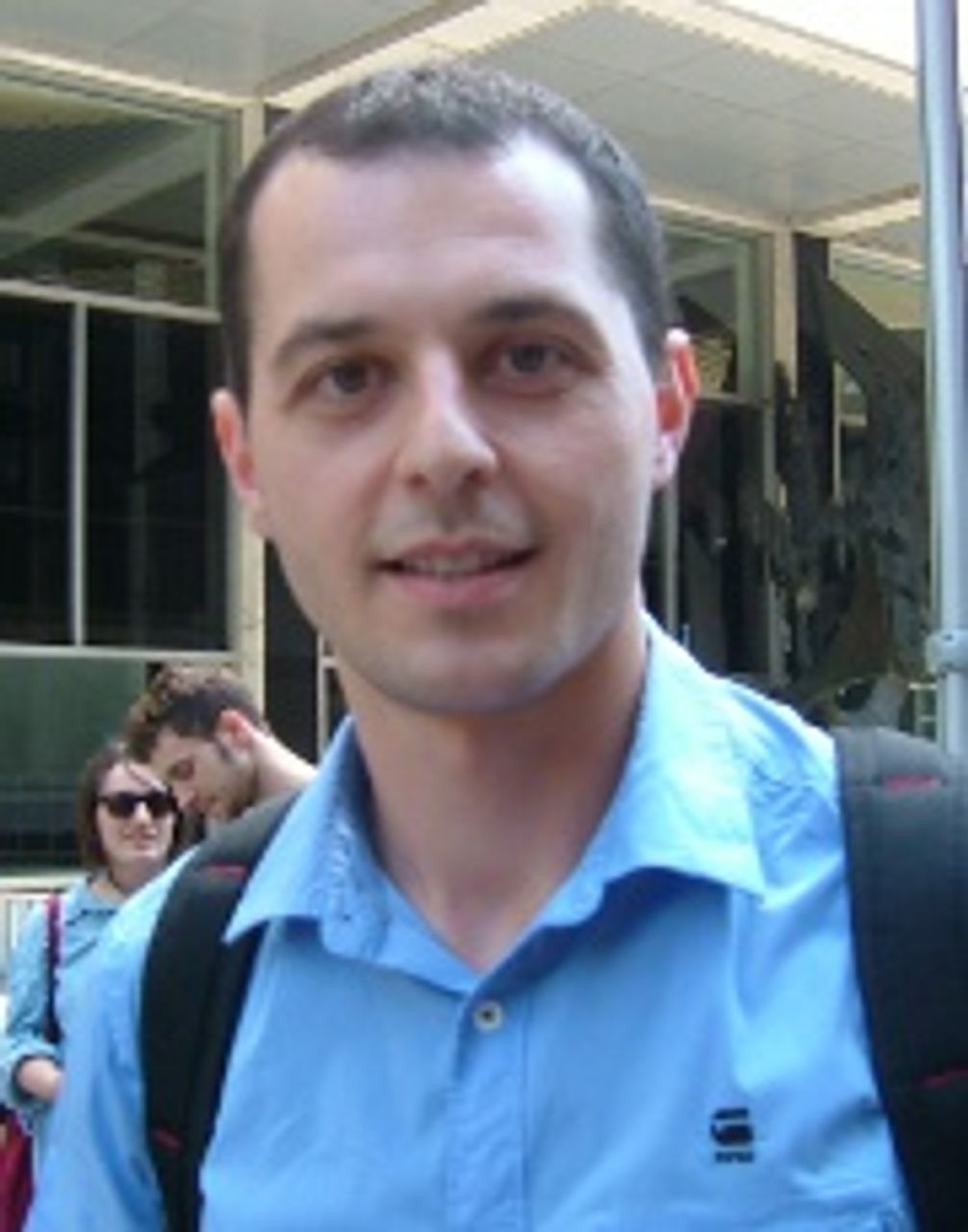 Goran
GoranGoran Jadrowski, a 29-year-old studying community welfare at the University of Western Sydney, said: “The same architects behind the economic collapse are now economic advisors to the government, and are overseeing these bailouts. These protests are empowering people, and enabling them to tell governments that we know what’s going on, and we won’t stand for it anymore.”
Jadrowski pointed to the international character of the protests: “You can see in Greece, the US, and increasingly in Australia, that the government represents big business more than it represents the people. That’s why I think the people need to stand up and unite.
“I think all the political parties are the same, whether they are Liberal, Labor or the Greens. The Greens supported this unpopular carbon tax, and so did a number of independents. I think we need to be aware of what’s happening politically. Finance and government have become so intertwined, and they are so corrupt, that a lot of people have given up on politics altogether. But I think politics needs to be brought back to its real purpose―to serve the people.”
In Melbourne, Adam, a former employee of Lehman Brothers who had moved with his family to Australia four months ago, observed that he had initially thought that the bank bailouts had been necessary to stave off a bigger financial crash.
“But the follow up post-bailout of not changing anything and repeating the same mistakes is what really angers me,” he said. “There hasn’t been any change. The bonuses are still getting paid out. I really like the slogan of the 99 percent versus the 1 percent because if you look at all the data starting in the 1980s, the same time of the boom of Wall Street, the 1 percent keeps getting richer and everyone else doesn’t. It’s not sustainable.”
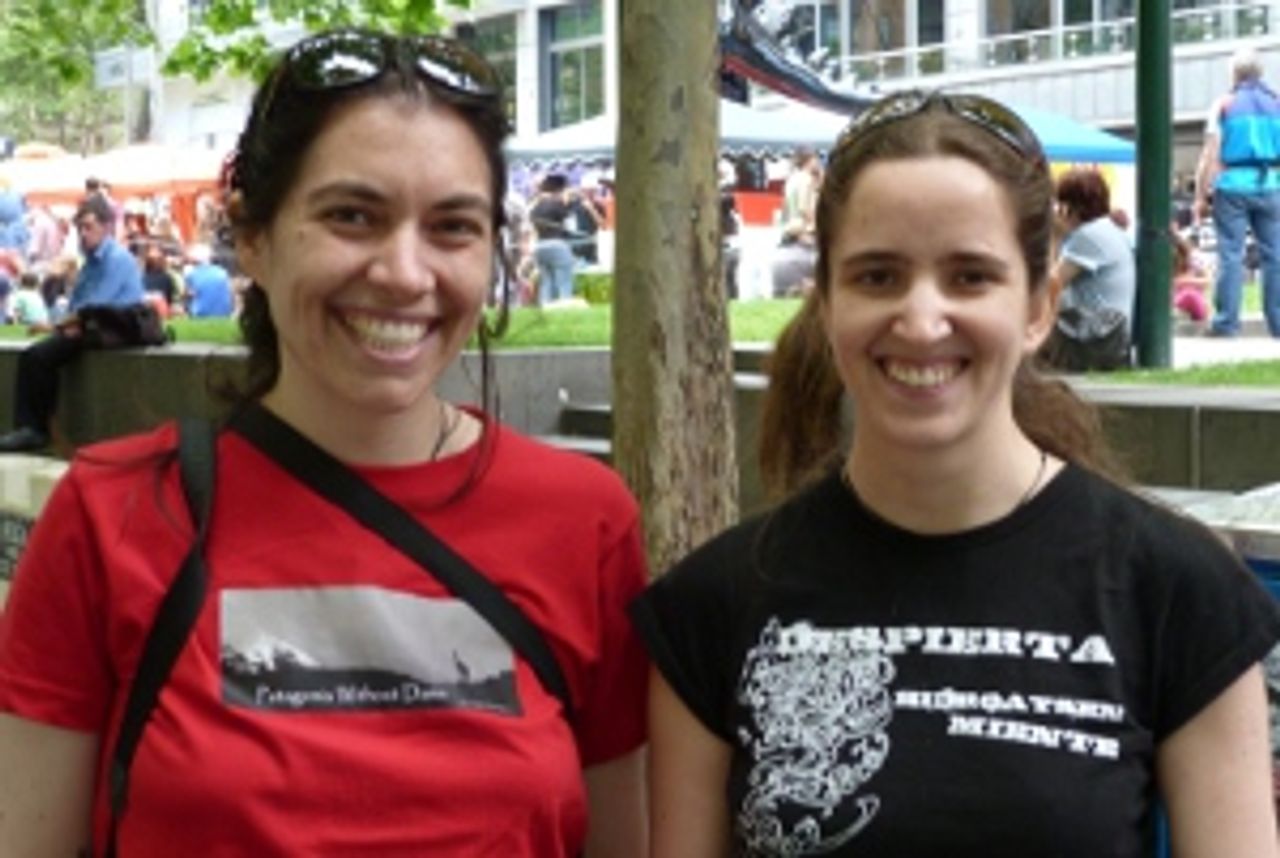 Jessica (left) and Magdalena
Jessica (left) and MagdalenaJessica and Magdalena came to Australia from Chile and are studying for degrees in environment studies at the University of Melbourne. Magdalena said: “The question of inequality in access to the education system is huge. There are the same problems here as in Chile—they are trying to make the education system very profitable. They don’t care about the quality. It’s necessary to create a system where everyone can access education and guarantee that it is good quality education.” She noted: “All the political parties here are the same thing.”
Jessica said: “People had faith in [US President] Obama, and that was an illusion. I was at a concert and they were all cheering when Obama was elected. Now you can see he is just the same.”
In Perth, demonstrators described the social reality behind the constant claims that Australia’s boom in mining exports is benefiting the working class, particularly in resource-rich Western Australia. Christine, who is receiving the Disability Support Pension, said she became involved with the protests when she saw the police violence against protesters in New York.
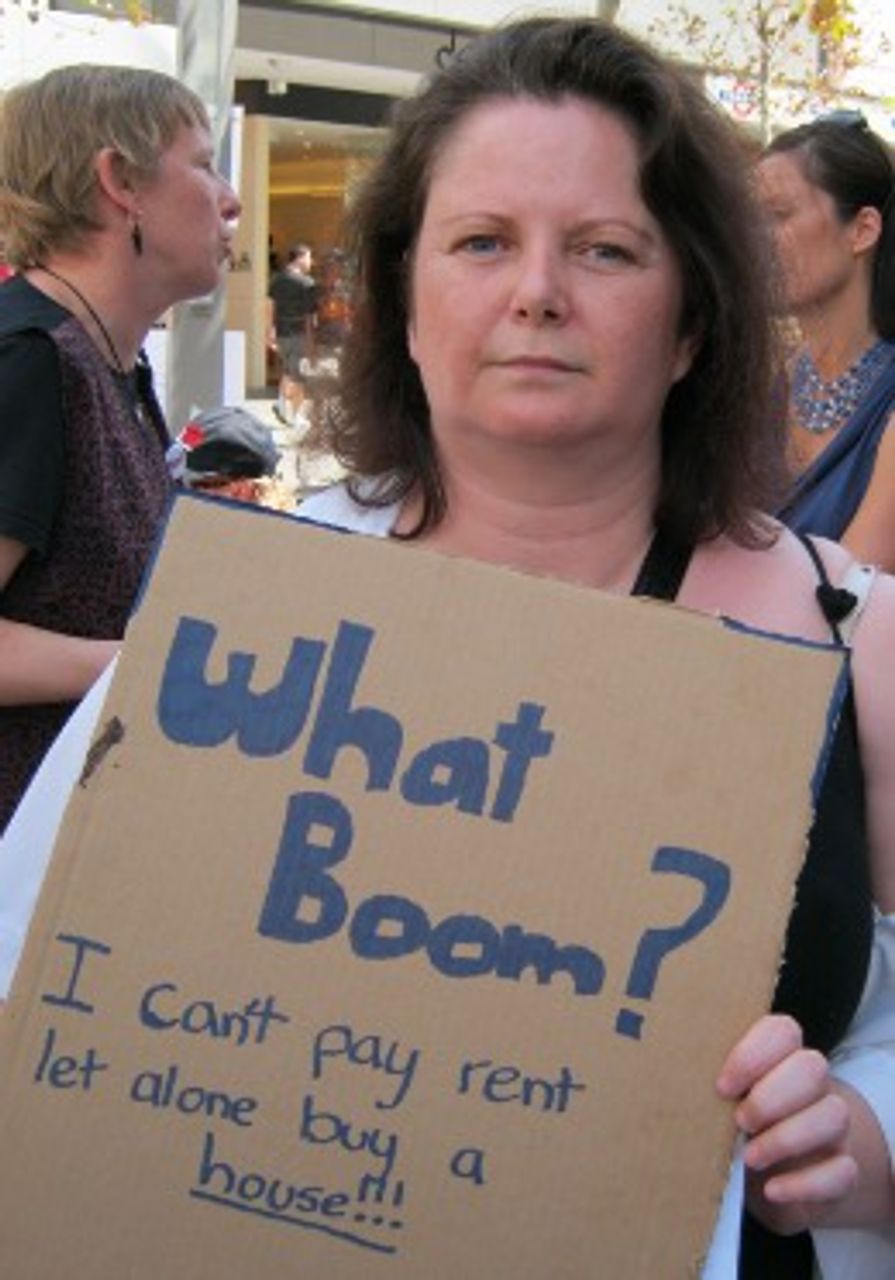 Christine
ChristineChristine said she had lost all her belongings in a house fire several years ago. “I experienced what it was like to be homeless,” she said. “There are a lot of things that go on in Western Australia that are not talked about in the mainstream media. The homeless get covered over and shifted along, and so many of our people are not getting looked after, because profit comes before people.
“Here in Western Australia, do you see the boom? I don’t! WA has one of the highest homeless rates in Australia. There is a huge chunk of West Australians that can’t buy a house or pay the rent. There shouldn’t be any homelessness in the middle of a boom.”
